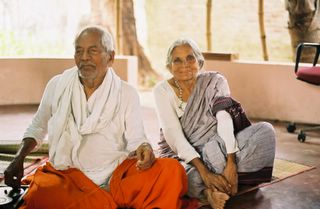The Old Days
She didn’t grow up even knowing what caste was. Yes, there were eight or nine higher caste families, but they didn’t have many children. They sat in the front of the classroom, but it really wasn’t a big deal. The schoolteacher (of higher caste) took meals in their home. It wasn’t until she came to Madurai that she really knew what caste was.
What they lacked was currency. It wasn’t exactly clear to her why it was needed, but slowly but surely the men would go to the nearby town to buy luxury goods and, especially, alcohol, until by the late ‘30s, most of them had lost their land, and ended up at the bottom of the employment heap. As she remembers, no one really understood what had happened until it was too late.
Her other strong memory of the period was learning to sing “God Save Our Gracious King” (George V). She hadn’t a clue who he was, and no Britishers frequented Ayyankottai.


0 Comments:
Post a Comment
<< Home